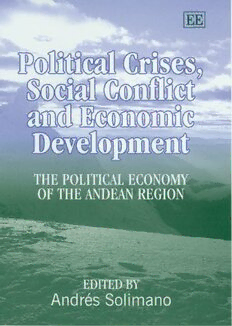
Political Crises, Social Conflict And Economic Development: The Political Economy of the Andean Region PDF
359 Pages·2005·1.282 MB·English
Most books are stored in the elastic cloud where traffic is expensive. For this reason, we have a limit on daily download.
Preview Political Crises, Social Conflict And Economic Development: The Political Economy of the Andean Region
Description:
The contributors to this authoritative volume analyze the impact of political crises and social conflict on economic performance in the Andean region of Latin America. The blend of theory and case studies is also relevant for understanding other complex societies in the developing world and transition economies. The book provides illuminating insights on how to understand, and survive, the complicated interactions between volatile politics, unstable democracies, violence, social inequality and uneven economic performance. Recent political economy theories are combined with valuable quantitative and qualitative information on presidential crises, breakdowns of democracy, constitutional reforms, quality of institutions, and social inequality and exclusion to understand actual country realities. Part I provides the conceptual framework and a regional perspective of the book. Part II contains five political economy country studies - Bolivia, Colombia, Ecuador, Peru and Venezuela - written by leading scholars in the field and former senior policymakers, including a former President. Together, the chapters highlight the detrimental effects of political instability and social conflict on economic growth and stability, as well as the feedback effects from poor economic performance on political instability and institutional fragility. The country studies warn that narrow economic reforms that do not pay adequate attention to politics, institutions and social structures are bound to fail in bringing lasting prosperity and stability to complex societies. Examining new and rich information on episodes of political turmoil, military interventions, forced presidential resignations, constitutional reforms and social uprisings, this book will be required reading for all those interested in the interface of politics and economic development.
See more
The list of books you might like
Most books are stored in the elastic cloud where traffic is expensive. For this reason, we have a limit on daily download.
